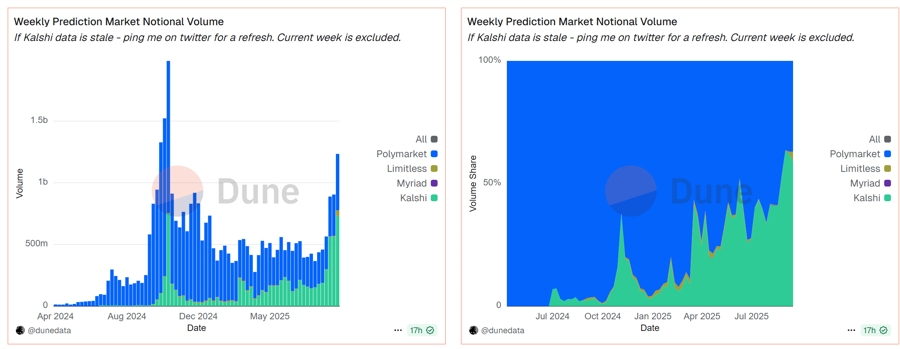Polymarket Dominates with 4% Yield - Highest in Sector as Kalshi’s Weekly Volume Explodes
Prediction markets are rewriting the rules of finance—and the yield game just got competitive.
Yield Wars Escalate
Polymarket's 4% APY now leads the prediction market sector, creating immediate pressure on competitors. The platform leverages crypto's native yield mechanisms while traditional finance struggles with sub-inflation returns.
Volume Tells the Story
Kalshi's weekly surge demonstrates retail's appetite for alternative returns. When banks offer 0.5% on savings accounts, betting on real-world outcomes suddenly looks rational—even conservative.
Market Mechanics Shift
These platforms bypass traditional banking infrastructure entirely. Settlement happens on-chain, cutting out intermediaries that typically skim 30-40% in hidden fees. The 4% yield represents pure efficiency gains.
Wall Street's math never included transparency—prediction markets force it.
Prediction Market Rivalry Heats Up as Kalshi Tops Polymarket by Volumes
While Polymarket’s new holding rewards seek to attract long-term bettors, competitor Kalshi has been dominating in terms of trading activity. For three consecutive weeks, Kalshi has posted higher volumes than Polymarket, recording $728 million in trades last week.
That figure is nearly 60% higher than Polymarket’s volume and close to Kalshi’s record $749 million during the run-up to the 2024 U.S. presidential election.

Data from Dune Analytics shows that between September 11 and 17, Kalshi captured 62% of total on-chain prediction market volume, with more than $500 million in trades and $189 million in open interest.
Polymarket, by comparison, registered $430 million in trading volume and $164 million in open interest over the same period.
Analysts note that Polymarket’s higher open interest relative to volume reflects longer-term positions, while Kalshi’s lower ratio points to faster turnover and more active trading.
The competition between the two platforms shows diverging strategies. Kalshi, operating as a CFTC-authorized exchange, has capitalized on regulated event-based contract trading in the U.S.
Polymarket, meanwhile, has historically catered to international users through blockchain-based markets but is expanding in the U.S. following its acquisition of the regulated exchange QCX. The company also recently launched earnings-based prediction markets in partnership with Stocktwits.
![]() @Polymarket has acquired Florida-based derivatives exchange QCX and its affiliated clearinghouse QC Clearing, together known as QCEX.#Polymarket #QCEXhttps://t.co/HjbqfUxhSD
@Polymarket has acquired Florida-based derivatives exchange QCX and its affiliated clearinghouse QC Clearing, together known as QCEX.#Polymarket #QCEXhttps://t.co/HjbqfUxhSD
Despite the differences in structure and oversight, both platforms continue to grow, with Kalshi solidifying its lead in weekly volume and Polymarket focusing on user retention through higher yields and long-term markets.
CFTC Clears Polymarket for U.S. Return as Kalshi Faces State Lawsuit
The prediction market space is entering a new phase as regulators in the U.S. take divergent approaches to two of its biggest players.
On September 3, the CFTC cleared Polymarket to re-enter the U.S. through a no-action letter covering event contracts.
![]() @PolymarketHQ gets US green light from CFTC after year of strategic moves including $112M acquisition.#Polymarket #UShttps://t.co/lPAnEbHzGS
@PolymarketHQ gets US green light from CFTC after year of strategic moves including $112M acquisition.#Polymarket #UShttps://t.co/lPAnEbHzGS
The MOVE marks Polymarket’s official return after a 2022 settlement forced it to block American users.
CEO Shayne Coplan hailed the clearance as “a green light” for U.S. operations, noting that it gives the company space to scale legally. The breakthrough comes as Polymarket pursues a valuation of up to $10 billion, more than triple its last known $1 billion valuation in June.
![]() Blockchain prediction market @Polymarket is preparing a return to the United States as it eyes a potential $10 billion valuation.#Polymarket #Cryptohttps://t.co/MROvtgwymw
Blockchain prediction market @Polymarket is preparing a return to the United States as it eyes a potential $10 billion valuation.#Polymarket #Cryptohttps://t.co/MROvtgwymw
The firm ROSE to prominence after its markets accurately predicted Donald Trump’s 2024 victory, drawing major institutional backing and user growth.
While Polymarket is regaining ground, rival Kalshi is facing legal hurdles. On September 13, Massachusetts Attorney General Andrea Joy Campbell filed a civil lawsuit accusing Kalshi of running unlicensed sports betting disguised as “event contracts.”
![]() Massachusetts sues Kalshi over alleged unlicensed sports betting with $1B in wagers as platform claims federal CFTC oversight protection.#Kalshi #Lawsuithttps://t.co/u8UyOvV0Q8
Massachusetts sues Kalshi over alleged unlicensed sports betting with $1B in wagers as platform claims federal CFTC oversight protection.#Kalshi #Lawsuithttps://t.co/u8UyOvV0Q8
The suit alleges that between January and June 2025, 70–75% of Kalshi’s $1 billion in wagers came from sports markets, rivaling licensed operators like DraftKings. Regulators say the platform allowed underage betting and lacked safeguards required by state law.
As Polymarket moves forward with regulatory cover, Kalshi’s future could hinge on a growing clash between state gambling laws and federal commodities oversight.

